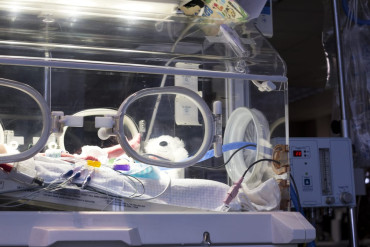The Complications Of Herpes Meningoencephalitis In Babies

Herpes infections are very common. In fact, it’s estimated that 50 to 80 percent of adults in the U.S. have herpes simplex virus type 1 (HSV1), typically associated with oral herpes, which causes cold sores in or around the mouth. Additionally, about one out of six people (ages 14-49) have HSV2, or herpes simplex virus type 2, which is typically sexually transmitted and commonly affects the genitals. Herpes infections can be active, with outbreaks of sores or blisters, or asymptomatic, meaning the individual has no physical signs of the infection. Still, either type can cause oral or genital herpes.
Both types of herpes are transmitted through close or intimate contact. This includes when a mother with an active case of the virus gives birth to a baby. The baby can contract the virus when a vaginal delivery is performed, leading to meningoencephalitis.
Meningoencephalitis caused by herpes occurs when the infection affects the brain and its covering. If this happens, the baby is at risk of serious injury or death if the infection isn’t properly diagnosed and treated quickly.
What Are The Risk Factors For Herpes Meningoencephalitis?
The most important risk factor for neonatal herpes meningoencephalitis, or the transmission of the infection from mother to newborn, is a first-time herpes infection in the mother. A pregnant woman who contracts genital herpes in the second half of her pregnancy has the highest risk of transmitting HSV to the baby.
Other risk factors for HSV include:
- Delivery before 38 weeks of pregnancy
- First-episode maternal infection in the third trimester
- Mother younger than 21 years old
- The use of delivery instruments or invasive tools, like vacuum or forceps, or fetal scalp electrode monitoring
How Is Herpes Meningoencephalitis Diagnosed?
In adults, including pregnant women, HSV meningoencephalitis is diagnosed using various tests a doctor orders. If a doctor suspects a medical condition is HSV meningoencephalitis, the following tests and examinations may be performed to make a diagnosis:
- Blood tests – Testing blood may show indications of the HSV meningoencephalitis infection.
- Neurological examination – The doctor will identify changes in vision, coordination, balance, motor function, sensory function, and mental status that may indicate the condition.
- EEG – This test measures brain waves using electrodes placed on the scalp.
- Imaging – The doctor may order a CT scan or MRI to examine the brain.
- Lumbar puncture – A sample of the spinal fluid is taken for this test. Cells and other substances in the spinal fluid may provide clues that the infection is present.
If a doctor suspects a newborn has developed herpes meningoencephalitis due to becoming infected with HSV2 as it moved through the birth canal, blood and spinal fluid will likely be tested, and the baby should be treated with intravenous acyclovir.
What Is The Treatment For Herpes Meningoencephalitis?
Treatment for HSV meningoencephalitis involves addressing the cause of the infection. Because HSV causes most cases, antiviral medication is the first course of treatment. Acyclovir is the medication most commonly used as treatment and may be administered intravenously. Babies treated for HSV meningoencephalitis may be on the medication for several weeks.
What Are The Complications Of HSV Meningoencephalitis For Babies?
The complications of HSV meningoencephalitis for babies depend on the severity of the infection but can include death. Babies who survive the infection often have long-term or permanent injuries, including:
- Learning disabilities
- Developmental delays
- Brain damage
- Blindness, hearing loss, speech loss
- Seizure disorders
- Cerebral palsy
- Brain abscesses
- Edema (buildup of fluid in the brain)
How Does Medical Malpractice Cause HSV Meningoencephalitis?
Medical malpractice and birth injury lawsuits involving HSV meningoencephalitis are usually a result of poor diagnostic work that leads to the condition going untreated or a delay in treatment. This medical condition needs quick treatment to prevent the most serious injuries. If there is a delay in treatment, or the doctor fails to order the appropriate diagnostic testing to detect herpes meningoencephalitis, antiviral medication isn’t administered, and the patient may die. In those cases, it’s essential to seek the help of an experienced birth injury attorney.
Do You Need An Experienced Birth Injury Lawyer In Pennsylvania?
In Pennsylvania, the law office of Ross Feller Casey is here to help parents of babies who suffered injury or death due to medical negligence or error on the part of a doctor, nurse, or other medical professional. Our attorneys are experienced with HSV meningoencephalitis and other birth injury cases, and we have leading physicians on staff who are experts in medical treatments and procedures. They review medical records and assist our attorneys in determining whether medical negligence is to blame.
If your baby suffered injuries or death after contracting herpes meningoencephalitis in Philadelphia, across Pennsylvania, and New Jersey, contact Ross Feller Casey today for a free case evaluation. We are here to help parents like you with the financial and emotional burdens your family carries due to your baby’s injuries.
We handle all our cases, including those involving HSV meningoencephalitis malpractice, on a contingency basis. So, you will never be asked to pay a thing until a financial recovery is made in your case.
Disclaimer: Ross Feller Casey, LLP provides legal advice only after an attorney-client relationship is formed. Our website is an introduction to the firm and does not create a relationship between our attorneys and clients. An attorney-client relationship is formed only after a written agreement is signed by the client and the firm. Because every case is unique, the description of awards and summary of cases successfully handled are not intended to imply or guarantee that same success in other cases. Ross Feller Casey, LLP represents catastrophically injured persons and their families in injury and wrongful death cases, providing legal representation in Pennsylvania and New Jersey.





